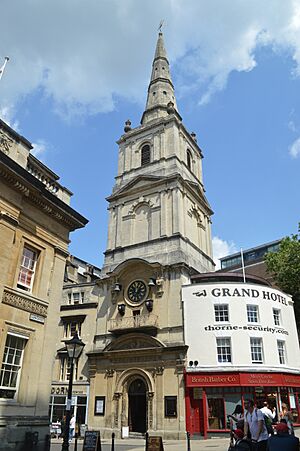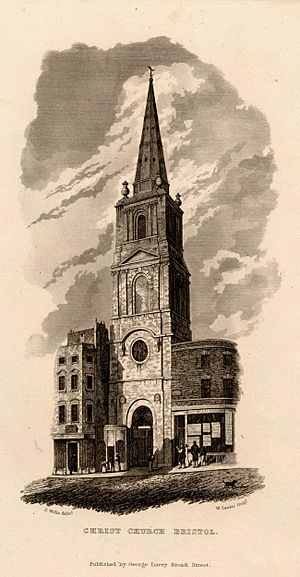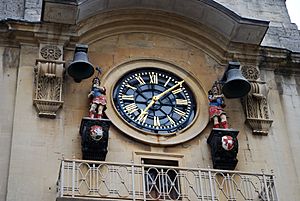Christ Church with St Ewen, Bristol facts for kids
Quick facts for kids Christ Church with St Ewen |
|
|---|---|
 |
|
| 51°27′19″N 2°35′34″W / 51.4552°N 2.5929°W | |
| Location | Bristol |
| Country | England |
| Denomination | Church of England |
| Tradition | Book of Common Prayer |
| Architecture | |
| Heritage designation | Grade II* |
| Architect(s) | Thomas and William Paty |
| Architectural type | Baroque |
| Years built | 1786–1791 |
| Administration | |
| Parish | Christ Church with Saint Ewen, All Saints and Saint George, Bristol |
| Archdeaconry | Bristol |
| Diocese | Bristol |
Christ Church with St Ewen is a historic Church of England church. You can find it on Broad Street in Bristol, England. It's a special building that has been around for a long time.
The church was built between 1786 and 1791. The tower was likely designed by Thomas Paty. His son, William Paty, probably designed the main part of the church. The building work was done by Thomas Paty and Sons. Later, in 1883, Henry Williams updated the entrance and inside of the church. The church was also restored in 1973 by Rev. G. S. Zimmern.
One cool feature of the church tower is its clock. It has "quarter-boy" figures that strike the bells every 15 minutes. This church is considered a Grade II* listed building. This means it's a very important historical building.
Contents
History of St Ewen's Church
Before Christ Church, there was another church called St Ewen's. It was located across the street from where Christ Church stands today.
The Oldest Document
A very old document from about 1141 talks about St Ewen's church. It's called the Charter of Theobald. This document is the oldest one kept at the Bristol Archives. It mentions a vicar named Turstin who worked at the church.
A Helping Hand
St Ewen's church was built in the early 1100s. In 1639, Matthew Hazzard became the vicar. His wife, Dorothy Hazzard, was known for helping people. She would let pregnant women stay at the parsonage, which was the vicar's house. She also gave homes to families who were traveling to America.
Joining Parishes
In 1790, the parish of St Ewen's joined with Christ Church. The old St Ewen's church building was taken down in 1820. This was done to make space for a bigger Council House. Today, that building is the Bristol Register Office.
Church Building and Style
The Christ Church building you see today is made of Bath stone. It was designed in the Baroque style. This style often features grand and detailed designs.
Building Timeline
- 1786–1791: The church was built by William Paty.
- 1883: Henry Williams carried out a "Victorian restoration." This means he updated parts of the church in the style popular during the Victorian era.
Worship and Traditions
Worship at Christ Church follows the traditions of the 1662 Book of Common Prayer. This is a very old and traditional way of conducting church services. The church supports the Prayer Book Society. This group helps promote the use of traditional church services in the Church of England.
Bible Readings
The Bible readings used in services come from the Authorised Version of the Bible. This is also known as the King James Version. It's a classic translation of the Bible.
Church Leadership
The church receives special guidance from the Bishop of Oswestry. Currently, this bishop is Paul Thomas. This is part of how the church is organized within the Church of England.
See also
- Churches in Bristol
- Grade II* listed buildings in Bristol



